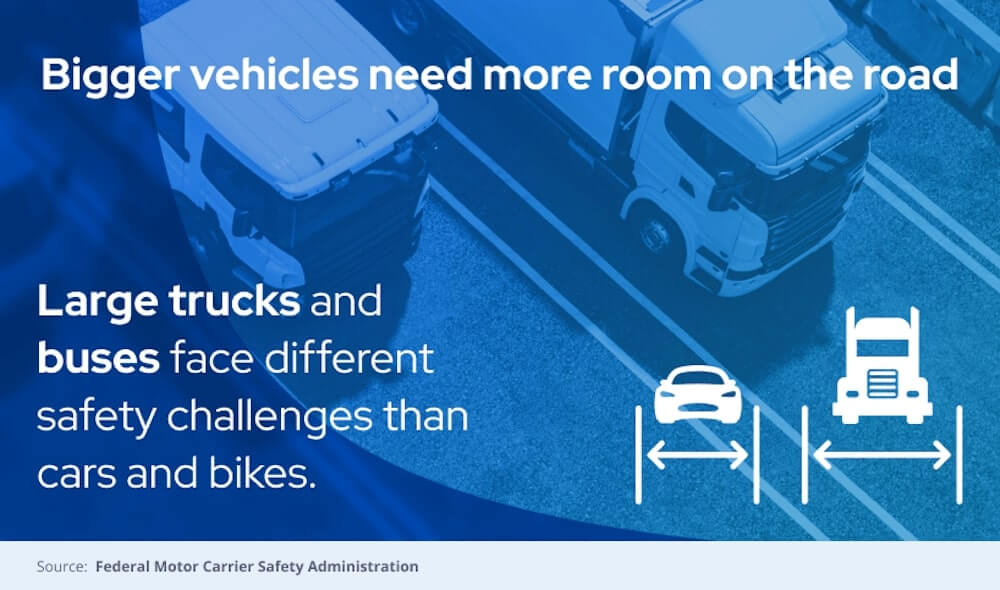Chadwick Meyers is one of the leading Tennessee truck accident lawyer of Meyers Injury Law who will stop at nothing to get you the compensation you deserve. He is recognized as one of the best personal injury lawyer in Tennessee and is a part of the Top 40 Under 40 by the National Trial Lawyers Association.
Truck Accident Legal Services in Tennessee
Few things on the Tennessee roadways are quite as dangerous as large commercial trucks, which is why trucks and truck operators are subject to enhanced safety regulations. If a semi-truck strikes your vehicle, the potential for injury is exponentially higher due to the substantial difference in weight.
Chad Meyers of Meyers Injury Law represents the victims of semi-truck accidents thoughout Tennessee on a contingency basis. That means that you do not have to pay out of pocket for his professional legal advice. Call today and discuss your truck wreck with our legal team.
How Dangerous are Truck Accidents?
Under federal regulations, the maximum gross weight of a semi-truck is 80,000 lbs. However, even with an empty trailer, the combined weight of the semi-truck and trailer is 35,000 lbs. The average weight of passenger cars is about 4,000 lbs, meaning an empty trailer is eight times the weight of the average car and semi trucks are potentially 20 times the weight of private passenger vehicles. That’s why any encounter with a moving commercial truck will likely end in serious injuries.
The other factor that determines the seriousness of a truck crash is speed. Since many big rig accidents occur on highways and major roadways, the speeds tend to be much higher.
Who Has Liability in a Truck Accident?
To have a viable case, Tennessee truck accident lawyers will examine the following four factors to determine liability.
1. Duty of Care
All drivers have a duty of care to everyone using the road. Still, because of the added danger commercial trucks present to other vehicles, commercial truck operators have an enhanced duty of care to operate their eighteen-wheeler safely. Additionally, a trucking company has a duty to maintain their trucks.
2. Breach of Duty
The next thing that a truck accident lawyer will examine is whether or not there was a breach of duty committed by the truck driver. Did they commit a moving violation? Were they drinking at the time of the truck accident? Did they fail to follow the mandatory schedule for breaks?
3. Causation
Here’s the revised version with Tennessee-specific references:
In order for an accident case to be actionable, the breach of duty must have been at least partially responsible for the accident. Under Tennessee’s modified comparative negligence laws, truck accident victims can still recover losses if the crash was primarily the other party’s fault.

4. Damages
If you’ve been in a truck accident, you don’t need to have suffered a catastrophic injury to file a claim. Any losses you’ve incurred—medical bills, lost wages, vehicle damage, pain and suffering—may be grounds for compensation.
When you sit down with our Tennessee truck accident lawyer, we’ll go over the details of your case and make sure all four legal elements are in place. Most people don’t reach out to a lawyer unless they have a real case, and that’s what we’re here to confirm. At Meyers Injury Law, we offer free consultations with no obligation—so there’s absolutely no risk in reaching out to discuss your truck accident.
Most Common Types of Truck Accidents in Tennessee
Trucks are subject to the same types of accidents that passenger vehicles experience in car vs. car accidents: intersection accidents, improper lane changes, rear-end collisions, etc. However, because of their immense size, truck drivers are more prone to certain types of accidents.
These are some of the more common truck-specific accident types:
Jackknife Truck Accidents
Jackknife trucking accidents often occur when the vehicle turns too quickly, and the momentum of the heavy trailer carries it in a different direction than the cab — loosely giving it the appearance of an opened folding knife.
Blind Spot Crashes and Collisions
Large trucks have long blind spots, which is why many semi trucks are labeled with warnings to the drivers of smaller vehicles about the blind spot. Truck drivers are responsible for checking their blind spots before changing lanes.
Improper Load Accidents
When materials are improperly secured, they can either come loose from an open trailer or fly around like projectiles in an enclosed trailer. This can cause the trailer to respond unpredictably.
Hazardous Material Spills
Commercial trucks transport many different types of hazardous materials. Federal law has established laws and regulations about the training of truck drivers engaged in transporting hazardous materials and the types of tractor-trailers that are rated to carry hazmat. That does not, however, mean that serious accidents result in a spill.
Underride Semi-Truck Accidents
This is a particularly dangerous type of truck accident that occurs when a smaller vehicle collides with a large truck and slides underneath. Because the clearance is too low for car occupants to pass safely under the truck, these crashes almost always result in serious injuries such as broken bones, traumatic brain injuries, or even death. In the most severe cases, victims may suffer fatal injuries due to the impact.
These are just a few of the unique dangers associated with large trucks. If you have been injured in a trucking accident in Tennessee, call Meyers Injury Law to discuss the specifics of your case. Our Tennessee personal injury law firm also represents family members and estates in wrongful death claims related to trucking accidents.
Regulations for Fatigued Truck Driving
The Federal Motor Carrier Safety Administration has established the following limits for truck operators:

Property-Carrying Driver Limits
- Maximum 11-hour driving limit after ten consecutive hours off duty
- Mandatory 30-minute break when driving for a period of 8 hours
Passenger-Carrying Driver Limits
- Maximum 10-hour driving limit after 8 hours off duty
- No mandatory break during their 10-hour driving period
Operators of large commercial vehicles are required to keep driver logs documenting their travels. However, these records are not always accurate, as fraudulent entries are common. This is why Tennessee truck accident lawyers will carefully review trucking company logs, GPS data, and other records. In many cases, there are significant discrepancies between a truck driver’s logs and the records maintained by the trucking company.
Truck Accident Statistics
According to the Federal Motor Carrier Safety Administration, Tennessee is one of the top ten states for truck-related fatalities.
The FMCSA keeps detailed statistics about trucking accidents. Their 2020 report yielded the following information about trucking accidents:
- There were 4998 truck accident cases where there were one or more fatalities.
- During the period from 2010 to 2020, there was a 31% increase in fatal truck crashes.
- There were 108,000 truck accident cases involving injury to one or more parties.
- There were 46 school buses, 9 city buses, and 86 transit buses involved in crash fatalities.
- In Tennessee, there were 1,257 fatalities involving trucks or buses from 2007 to 2017.
If you’ve been injured in a truck accident or someone in your family has died from injuries caused by a truck accident, contact a truck accident attorney immediately. The statute of limitations for filing a claim is one year. Call today.
What You Should Do if You’ve Experienced a Trucking Accident
The first minutes following a collision with a large commercial truck are critical. Focus on maintaining your safety while you’re at the accident scene.
Find a Place of Safety
Passenger vehicles offer little protection where tractor-trailers and other large commercial vehicles are involved. If your car is in an unsafe location, either due to additional traffic or hazardous materials, get to a position of safety. If your car can’t be moved, you need to weigh the safety offered by your car vs. exiting your vehicle.
Call First Responders
Try to remain calm while speaking to the dispatcher. They will be dispatching units as you speak. They will require the exact location or a close approximation, the direction of travel, a description of the vehicles involved, the number of injured accident victims and the types of injuries, etc.
Ensuring that a police report is properly filed after a collision is crucial, as it provides an official account of the accident and can serve as vital evidence in your claim.
Talk to Witnesses on Scene
It may be difficult to determine who was involved in the accident if there are multiple parties involved. If a driver just stopped to check on injuries, ask them to remain to speak to the police or get their contact information.
Take Pictures with Your Phone
Many Tennessee truck accident lawyers have successfully built strong cases because accident victims took the time to document the scene with pictures. From a position of safety, try to capture images of the overall scene, the truck, the truck driver, other accident victims, passenger vehicles involved, visible injuries, debris on the roadway, skid marks, and geographic landmarks. Download all of this evidence to a secure location until you can forward it to your truck accident attorney.
Seek Medical Attention
Allow first responders to examine you, even if you feel fine. If they recommend that you go to the hospital, follow their advice. It will not interfere with the legal process. On the contrary, it will help establish a baseline for your case, including documenting any potential injuries.
Contact a Truck Accident Attorney
The trucking industry often relies heavily on insurance companies to protect them from having to pay out enormous damages for serious accidents. Without legal guidance, victims may find it challenging to recover the compensation they deserve.
If you’re wondering what to expect when filing a personal injury claim, understanding the process can make all the difference. For more details, learn about the steps involved and how to navigate a claim successfully.
Insurance companies that cover trucking are known for immediately dispatching adjusters to truck accident scenes. If you have already left the scene, they will try to reach out to you within 24 hours. Their objective is to get you to accept a settlement before you start talking to a truck accident lawyer. That’s because they know that once you have legal representation, their chances of settling the claim quickly are greatly diminished. So, call a truck accident attorney before you accept a settlement.

Damages in Truck Accident Cases
Tennessee has three types of damages for personal injury cases. The first two are economic damages and non-economic damages, which are considered compensatory in nature. The third type is punitive damages, which are sometimes awarded to punish the defendant for wanton or intentional disregard for the safety of others.
Economic Losses
Economic losses include all financial outlays that the plaintiff has incurred as a result of the tractor-trailer accident: medical bills, lost wages, vehicle damage, etc.
Non-economic Losses
Non-economic losses are also referred to as “pain and suffering” because they address the physical pain, emotional trauma, and other difficulties and inconveniences caused by the accident. Tennessee caps non-economic losses at $750,000 in most types of personal injury claims.
Punitive Damages
The cap for punitive damages is the greater of $500,000 or two times the amount of compensatory damages.
FAQs About Tennessee Truck Accidents
If you’ve been injured by a negligent truck driver in Tennessee, you may have questions about your truck accident claim, including how to proceed. The information contained on this page is not legal advice. If you want legal guidance specific to your case, contact Meyers Injury Law for a free consultation.
What should I do if I’m involved in a truck accident on a Tennessee interstate?
Being involved in a truck accident on a Tennessee interstate can be a traumatic and overwhelming experience. Here’s a step-by-step guide on what to do to ensure your safety and protect your legal rights:
- Ensure Safety: First and foremost, prioritize your safety and the safety of others. If possible, move your vehicle to a safe location, such as the shoulder of the road, to avoid further collisions. Turn on your hazard lights to alert other drivers.
- Call 911: Report the accident immediately. Emergency responders will provide medical assistance, and the police will document the incident, which is crucial for any future claims. Make sure to get a copy of the police report.
- Seek Medical Attention: Even if you feel fine, it’s important to get checked by a medical professional. Some injuries may not be immediately apparent. Medical documentation is also vital for your claim.
- Gather Information: Collect as much information as possible at the scene. This includes the truck driver’s name, contact information, insurance details, and the trucking company’s name. Take photos of the accident scene, vehicle damage, and any visible injuries. If there are witnesses, get their contact information as well.
- Avoid Admitting Fault: Be careful with your statements at the scene. Do not admit fault or make any statements that could be used against you later. Stick to the facts when speaking with the police and other parties involved.
- Notify Your Insurance Company: Report the accident to your insurance provider promptly. Provide them with the necessary details but avoid giving recorded statements without consulting an attorney.
- Consult an Attorney: Truck accidents often involve complex legal issues, including multiple parties and federal regulations. An experienced attorney can help you navigate the claims process, negotiate with insurance companies, and ensure you receive fair compensation.
For expert guidance and to protect your rights, contact Meyers Injury Law. Our team can help you understand your legal options and navigate the complexities of truck accident claims, ensuring you get the support and compensation you deserve.
How can I file a claim with a trucking company based out of state after an accident in Tennessee?
Filing a claim with an out-of-state trucking company after an accident in Tennessee involves several important steps. Here’s a guide to help you navigate the process:
- Seek Medical Attention: Your health is the top priority. Get medical treatment immediately, even if you think your injuries are minor. Documenting your injuries is crucial for your claim.
- Report the Accident: Call 911 to report the accident and ensure an official police report is filed. This report will be a key piece of evidence in your claim.
- Gather Information: Collect as much information as possible at the scene. This includes the truck driver’s name, contact information, insurance details, and the name of the trucking company. Take photos of the accident scene, vehicle damage, and any visible injuries. Also, gather contact information from any witnesses.
- Notify Your Insurance Company: Report the accident to your insurance provider promptly. Provide them with the necessary details but avoid giving recorded statements without consulting an attorney.
- Identify the Appropriate Jurisdiction: Since the trucking company is based out of state, you need to determine the appropriate jurisdiction for filing your claim. Generally, you can file in the state where the accident occurred (Tennessee) or in the state where the trucking company is based.
- Consult an Attorney: Trucking accidents often involve complex legal issues, including federal regulations and multiple parties. An experienced attorney can help you understand your rights, determine the best jurisdiction for your claim, and navigate the legal process. They can also handle communication with the trucking company and their insurance provider.
- File Your Claim: With the help of your attorney, file a claim against the trucking company. This will typically involve submitting a demand letter outlining your injuries, damages, and the compensation you seek. Your attorney will negotiate on your behalf to reach a fair settlement.
For expert assistance and to ensure your rights are protected, contact Meyers Injury Law. Our team can guide you through the complexities of filing a claim with an out-of-state trucking company, helping you secure the compensation you deserve.
How much time can I take to file my truck accident case?
The statute of limitations in Tennessee is one of the shortest in the nation. You have one year from the date of the accident to file a lawsuit. In wrongful death cases, you have one year from the date the accident victim passed away.
Who is responsible for my impairments if I decide to seek compensation?
All major trucking companies have insurance policies covering their large truck fleets. While the truck driver may be responsible for your injuries, the insurance company will be responsible for paying your claim.
There are situations where multiple parties are responsible for a single accident. A truck accident lawyer can determine whether the truck manufacturer, a third-party maintenance service, or the truck owners share responsibility for your injuries.
What types of truck accident claims do you handle in Tennessee?
We represent clients in all types of trucking accident claims involving driver negligence, trucking company negligence, third-party negligence, and more.
What if I’m partially at fault for a truck accident?
Tennessee law allows accident victims to seek compensation for their injuries if they were less than 50% responsible for the accident. For example, if a passenger vehicle strikes the trailer of a large truck because the truck driver ran a red light, the car driver may still be able to recover damages—even if they were speeding.
Experienced Truck Accident Lawyer in Tennessee
Trucking companies and their insurers hire teams of accident defense lawyers to avoid paying full and fair settlements. That’s why you need your own attorney to hold the trucking companies accountable.
Attorney Chad Meyers of Meyers Injury Law handles Tennessee truck accident cases where truck drivers or trucking companies demonstrate negligence. If you’ve been injured in a truck accident in Tennessee, we want to talk to you. We work on a contingency basis, so if we don’t win, we don’t collect our fees. Contact us for a free, no-obligation consultation.
The truck accident attorneys at Meyers Injury Law are committed to recovering compensation for catastrophic truck accident injuries. Every year, we recover millions of dollars for our clients and will aggressively pursue compensation on your behalf. Contact us today to get started on your case.













